
Commissioner for European Neighbourhood Policy and Enlargement Negotiations, Johannes Hahn, said: "With this new assistance package the EU continues to support the Palestinians on their way towards the establishment of their own state as part of the two-state solution, with Jerusalem as capital of both Israel and Palestine. The European Union is, and will remain, Palestine's most reliable and important donor, investing in businesses, youth and schooling, helping to provide access to clean water in Gaza, strengthening civil society and investing on education and health."
The newly adopted €42.5 million assistance package includes:
€14.9 million for activities in East Jerusalem to preserve the Palestinian character of the city and counter the worrying deterioration of socio-economic indicators that include widespread poverty. Projects will focus on advocacy and protection actions, youth and education and support to the private sector, with the overall aim to boost economic development.
€27.6 million to support the building of a democratic and accountable Palestinian State through targeted policy reforms, fiscal consolidation, reinforcing businesses and SMEs, strengthening of Palestinian Civil Society and providing access to water and energy.
The package comes in addition to already adopted EU funding of €158.1 million in direct financial assistance to support the Palestinian Authority in meeting its recurrent expenditure (salaries and pensions, assistance to vulnerable Palestinian families, arrears of East Jerusalem hospitals) and the delivery of public services. €107 million was also provided to UNRWA, the United Nations Relief and Works Agency for Palestine Refugees. Finally, €18 million was provided for supporting productive investments both in the West Bank and in Gaza.
Background
EU support to the Palestinians covers a wide range of areas, including humanitarian assistance, capacity building, democratic governance and socio-economic development. In 2017, it amounted to nearly €359 million from all financing sources.
The €42.5 million package is financed by the European Commission with the European Neighbourhood Instrument (ENI) which is one of the main sources of support from the EU to the Palestinians.
The annual ENI budget in support of the Palestinians is framed by the "European Joint Strategy in Support of Palestine 2017-2020" agreed by the EU Institutions, 22 EU Member States* and Norway and Switzerland. The Joint Strategy identifies five priorities for EU and Member States' development cooperation, in alignment with the National Policy Agenda of the Palestinian Authority:
1. Governance Reform, Fiscal Consolidation and Policy;
2. Rule of Law, Justice, Citizen Safety and Human Rights;
3. Sustainable Service Delivery;
4. Access to Self-Sufficient Water and Energy Services;
5. Sustainable Economic Development;
The Joint Strategy was adopted by the Commission on 8 December 2017.
For more information:
European Commission:
European Neighbourhood Policy And Enlargement Negotiations - Palestine*
The Office of the European Union Representative (West Bank and Gaza Strip, UNRWA)
United Nations Relief and Works Agency for Palestine Refugees in the Near East (UNRWA)
*This designation shall not be construed as recognition of a State of Palestine and is without prejudice to the individual positions of the Member States on this issue.
Governorate
Major Sector

